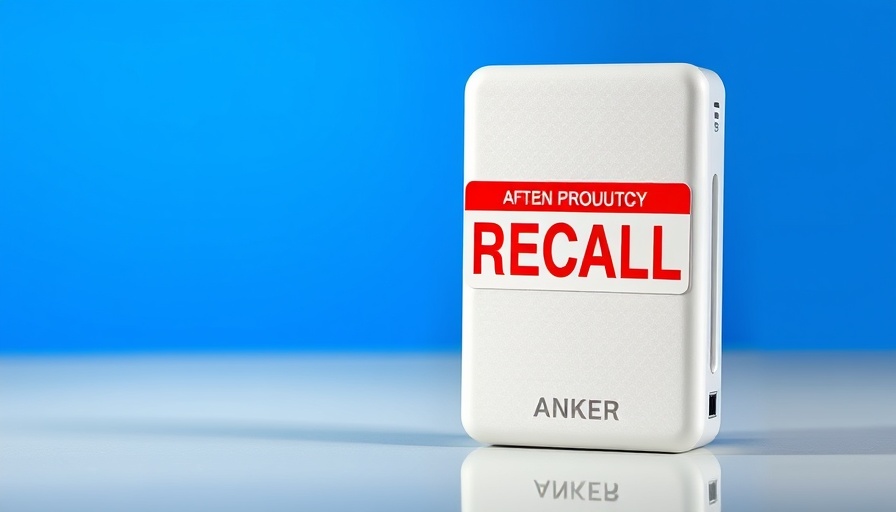
Fire Hazard Alert: Anker's Recall of Over 1 Million Power Banks
In today's fast-paced world, staying connected is essential, and portable power banks have become a staple for many. However, Anker, a well-known manufacturer in the portable charger market, has reported significant safety concerns that impact over a million devices. With their recent recall, it’s vital to understand whether your Anker power bank is affected and what steps you should take to ensure your safety.
Understanding the Recall: Why It Happened
According to Anker, the recall is due to defects identified in the lithium-ion batteries used in several models. While Anker asserts that the risk of malfunction is minimal, they prioritize customer safety, stating that recalled batteries present a higher fire risk. This proactive measure arose from enhanced quality assurance protocols aiming to catch potential defects earlier in the manufacturing process. Understanding this context is vital, as battery safety is a pertinent issue not just for Anker but for all users of lithium-ion technologies.
Is Your Power Bank a Fire Risk?
Historically, this isn't the first time Anker has faced such scrutiny. Earlier in 2025, the U.S. Consumer Product Safety Commission (CPSC) announced a recall affecting model A1263 Anker PowerCore 10000 power banks, which was a mere tip of the iceberg. The latest recall now includes multiple models: A1257, A1647, A1652, A1681, and A1689.
If you possess any of these models, stop using them immediately. Anker has provided guidance since improperly disposed batteries can lead to severe hazards.
What to Do If You're Affected
Should you find yourself in possession of a recalled product, Anker has streamlined the process for you. They offer a Product Recall Submission Form, where you can easily submit your model information and opt for a replacement or gift card. As a reminder, keep your power bank until your claim is processed but ensure it is kept in a safe location away from flammable materials.
Addressing Common Myths: Understanding Lithium-Ion Battery Risks
Many users underestimate the risks associated with lithium-ion batteries, often viewing the recall as just another corporate procedure rather than a serious safety issue. A crucial point to understand is that lithium-ion batteries, while efficient, carry the potential for thermal runaway—a condition where excessive heat causes a chain reaction leading to fires. This inherent risk amplifies the importance of adhering to recalls and proper disposal practices.
Beyond the Recall: Key Lessons for Consumers
This incident serves as a stark reminder of the importance of product safety awareness. Here are some actionable insights you can implement:
- Be Proactive: Regularly check for product recalls on devices and household items, especially electronics.
- Stay Informed: Familiarize yourself with lithium-ion battery safety. Understanding how to handle these devices can prevent accidents.
- Responsible Disposal: Always dispose of electronic devices at certified facilities equipped for hazardous waste. Many recycling centers are ill-equipped to properly handle hazardous battery materials.
The Bigger Picture: Safety in a Tech-Driven World
As technology becomes increasingly integrated into our daily lives, awareness of the potential risks associated with these innovations remains critical. Problems with lithium-ion batteries aren’t isolated to Anker; similar issues have surfaced with various tech brands. Creating a culture of safety and proactive measures can help mitigate risks before they turn into dangers.
Conclusion: Stay Safe and Informed
The recent recall is a pressing reminder of the need for vigilance among tech users. By taking the necessary precautions, staying informed, and understanding the essential safety practices outlined above, you can navigate these risks effectively. Your safety is paramount. Take charge of your power bank ownership today!
 Add Row
Add Row  Add
Add 




Write A Comment